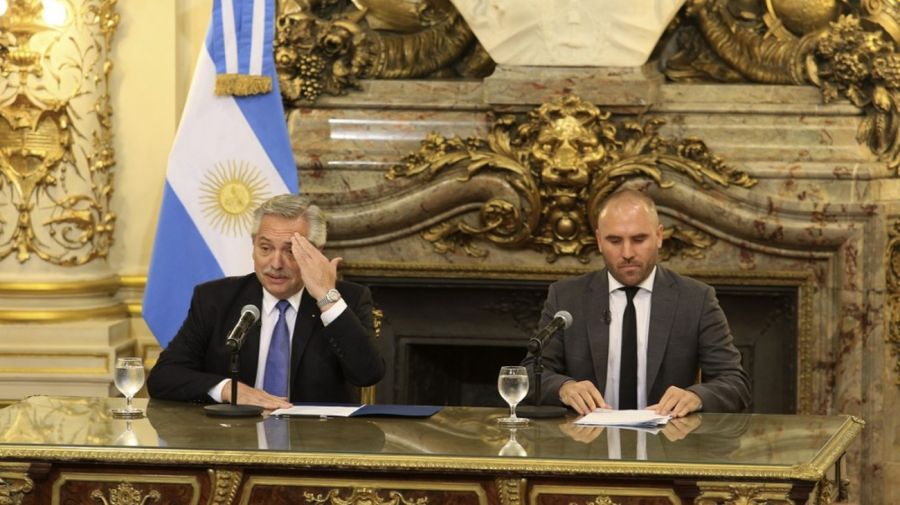Martín Guzmán left President Alberto Fernández's government in July 2022 after more than two-and-a-half years as economy minister.
In a feature interview, Guzmán – the man who headed the renegotiation of Argentina’s debt with the International Monetary Fund – expounds his interpretation of the inconveniences his ministry faced due to a lack of cohesion within the ruling Frente de Todos coalition.
The 40-year-old notes his differences with the current administration and his outlook for Argentina’s development in the next few years.
By how much will [Argentina’s] economy shrink this year?
The present is obviously influenced by an external factor, namely the drought with a significant impact on economic dynamics. We were then coming out of a sequence of three consecutive years of economic contraction between 2018 and 2020, followed by a very strong recovery in 2021 when Argentina had economic growth of 10.4 percent with massive job creation. This economic growth continued throughout most of 2022 but this is indeed a more difficult year for the Argentine economy.
A three percent drop in gross domestic product is attributed to the drought.
That’s from the drought. But at the same time...
Beforehand there were forecasts of two percent growth.
Yes, there were forecasts of growth in a context where most analysts were still not incorporating the shock effect of the drought.
Assuming two more quarters of contraction, do you think that in the last quarter of the year – when the effects of the drought on trade have already been left behind – growth can start again?
That will also depend in large part on the political situation, which is absolutely central for economic dynamics. I would say that in today’s Argentina, taking away the effects of the drought and the availability of hard currency, this is the most important thing for carrying forward an effective programme for attacking Argentina’s problems. The answer will thus depend on waiting until the whole electoral process has gone past before seeing a possible recovery on the horizon for next year.
What would happen if in August or October it became highly probable that the opposition will be the next government, how would that affect the economy this year?
Today the Argentine political spectrum is manifestly divided into three great blocs. It’s not just a question of talking of the opposition but also of the dynamics of the government. From the opposition standpoint there are two blocs proposing simplistic solutions to complex problems such as this idea of dollarisation, which would be a huge step back for Argentina, really serious. In the government the main issue is how to resolve the problem of what they represent, which is something we have already experienced, as indeed I did in my ministry. It is very important for any aspiration to stabilisation and economic development that there be the political capacity to implement an economic programme and to that end it is so important for the economy that there be people within government ranks who can resolve this problem of what it represents via votes, for which the PASO primaries are important. So those are the dynamics to be observed between now and the electoral dates, the definition of the lists on June 24, the August [13] primaries. That will be important for the future relationship between government and opposition, whoever the people choose to elect.
If after the PASO primaries in August or the first round in October it becomes clear that the government is competitive or, if not, that the most probable candidate to take office on December 10 is a libertarian or from Juntos por el Cambio, what would be the consequences of each of those three alternatives for the economy of the last quarter?
A competitive government which has resolved its problems as to who really leads it and which has discussed programmes with substance would help economic prospects. In the case of the opposition, the dynamics are very different…
Would the worst scenario be the libertarians with Juntos por el Cambio in the middle?
The libertarians have been much more explicit about what they plan to do. Juntos por el Cambio is a lot less explicit; sometimes I hear somebody saying: ‘I have a programme to lower inflation but I’m not going to tell you what it is,’ so it is still not known what they’re going to do. In the past when Juntos por el Cambio governed, there was a certain euphoria at first with the idea that investments would come pouring in and the country ended up brutally indebted to the International Monetary Fund with the Argentine economy profoundly destabilised. Much of the market enthusiasm of 2015 has already been lost in the case of Juntos por el Cambio, that is the reality – a huge disappointment on the part of those who believed in them. Then there are those of us who never believed in them, as is my case, and that does not give me much hope for the future of Argentina. What would give me hope is a Peronism sorting itself out, modernising, discussing programmes and resolving its internal problems via the vote of the people.
What do you think of raising interest rates and how inflation is being tackled?
This is an issue widely discussed in the general economic debate but also within the government. And here there is a question worth clarifying.
When we reached the agreement with the IMF to reschedule the debt of US$45 billion incurred by the Juntos por el Cambio government, a historical record, there was an economic programme which we considered to be consistent and well founded to lower inflation with the idea of attacking its multiple causes. Firstly, the lack of international reserves, for which a macroeconomic policy was needed permitting the country to keep growing but at a pace permitting an evolution of the imports accompanying the growth so that we would be able to accumulate reserves. And then to go lowering the Central Bank financing of the Treasury and public-sector deficits because in a country with a weak currency, as we would describe a bi-monetary economy, that partly means that the pesos printed do not encounter any public demand for saving purposes so some of those pesos head for the dollar while many end up being sterilised by the Central Bank in the form of Leliqs. And given that Argentina had and has heavy financing restrictions, in order to print less money the deficit had to be lowered and a path in that direction was designed.
The state must play an involved role in both the coordination of expectations and the distributive tussle in the form of price and incomes policies. But if we had a programme about which there was cohesion as to where it was heading, that helps the credibility of that programme by creating the expectation that the programme will indeed be implemented and if the inflationary factors are attacked, inflation can go down. That is where this issue of interest rates about which so much is spoken appears.
What were we seeking? That real interest rates be positive but beware of what that means. Positive with respect to the inflation for which we were aiming, to the expectations we were seeking to create with a programme backed by the political system and the entire ruling coalition, not real positive interest rates with respect to the previous inflation. So we were always looking at the monetary policy defining the nominal interest rate seeking to place it above the inflation rate but the expected inflation.
Well, there has been a change there which is reflected in one of the most recent memoranda of the reviews of the agreement with the IMF comparing nominal interest rates with the core inflation of the last few months. So what is going on there? A change in the pattern of the monetary policies which had been defined in the agreement with the IMF but is now different from what we were seeking to implement. If you ask me how I see the effects, what ends up happening is that inflation goes up, so interest rates do as well. In Argentina, as with the bank deposits, the Central Bank sterilises many of them with their Leliq liquidity bonds since the interest rate is what the state also pays. So how do you pay the higher nominal interest rates? Not with the deficit...
...with more deficit.
Yes but the deficit is not being reduced so fast and ends up being paid by printing money and everybody understands that so that it affects the expectations of inflation. So raising interest rates, from our point of view, ends up pressuring prices, as is occurring. So when a higher inflation figure is published, what do they do? Raise interest rates again, thus generating a vicious circle. That’s why it seems very important to me to explain two things.
Firstly, the programme with the IMF never could be implemented because it was not given the political cohesion needed for its success, the conditions were not there. Secondly, the economic policies were changed from those agreed in January, 2022.
When were they changed so that they could not be implemented from that moment?
They never were implemented. There was, I think, an excess of confidence which can be seen over the passage of time and stemming from the problem in Congress when Frente de Todos unanimity could not be obtained. The programme could thus never be really implemented because the fiscal policy and economic policy in general lacked the necessary political anchorage. It was very difficult to put through the planned economic policy as from March, 2022 , and the main factor making for change, although not the only one, is the pattern of monetary policy where we were seeking to place interest rates at a certain starting-point with a programme attacking the fundamentals of inflation so as to go constructing the conditions for reducing the rates in company with inflation. And what happened was exactly the contrary at a time when I was no longer in the government.
Before becoming minister you had written papers on differential exchange rates for different activities. In Argentina’s situation today, would you have had a system of differential exchange rates?
That was one of the great discussions within the government, the exchange rate regime. When we entered into government in December, 2019, the idea was effectively to change the exchange rate regime in accordance with what we called a scheme of macro-prudential regulations.
What does that mean? What it means is that we wanted to facilitate the entry and exit of capital for the real economy: energy, mining, agro-industry, hi tech, etc. – capital which comes in and drills wells or instals factories, not the speculative capital which flies in and out all of a sudden taking advantage of short-term financial opportunities. We wanted to discourage the movements of such capital which the previous government had liberalised and which was the first to start to leave as from April, 2018, turning the Argentine economy upside down. That is where and when the crisis started.
In my first press conference once in government on December 11, 2019, we outlined and immediately sent to Congress for approval a bill entitled ‘Solidaridad Social y Reactivación Productiva’ to consolidate the fiscal situation, above all to increase tax revenue because maintaining fiscal order was one of the pillars of the economic programme but at the same time we wanted the state to give a push to the economy because it was important to have more revenue in order to revive certain levels of spending in the economy, which was coming out of a severe recession. And that was working but afterwards the pandemic came along, altering the exchange rate plans for an Argentina without credit. In that situation we had to define what the state was going to do with public health, the economy, production, the most poverty-stricken sectors and restrictions on mobility. And what the state did was to intervene heavily in the economy with programmes to assist workers and production like subsidising wages in the private sector, reducing employer contributions and the IFE (Ingreso familiar de emergencia) family emergency benefit.
But there was no credit. How was that going to be financed? By printing money. We knew that it was going to be a lot more difficult to attack the problem of inflation and that normalising the exchange rate regime was also going to be difficult because suddenly we started having far more pesos in the economy. And if you wanted to restore order faster, there was going to be more demand for dollars which would hit food prices with a rapid unification. So that had its impact on the ideas we had for the programme.
We had to recalibrate with the pandemic. I believe that the worst problem we had from the purely economic viewpoint was not having transferred all services to another exchange rate market. This was fiercely discussed but there were not the conditions for doing that, above all to prevent the companies from amortising the capital of debts in foreign currency. Imagine yourself as the financial manager of a company with dollar debt and suddenly somebody says to you: “I’m going to give you so many dollars at a lower exchange rate than going out to buy them on the market.” So what are you going to do? You have to buy all the dollars you can at an exchange rate below the market but that means the Central Bank ends up selling dollars for companies to use to amortise their debts instead of accumulating reserves. This is also a very important issue to think about for the future.

If a trade surplus has not served to accumulate dollars, does that have to do with what you are mentioning?
That is the main cause but this is also very important for the future. Today there are discussions as to what is to be done from here on with the exchange rate issue, which is very important for the functioning of the economy. The big issue which Argentina has to resolve is its path towards a more productive economy and in order to achieve that, there are certain premises, certain pillars which everybody respects: education, the main factor for resolving the problem of poverty is for everybody to have education from the start, science and technology, public health, the sustainability of debts. All these issues are fundamental for thinking out the future. But from the macroeconomic viewpoint, it is vital to bring order to certain questions with the exchange rate regime very important. So looking over the experience of these last few years with each of the options bidding to govern Argentina saying: ‘I think this’ on how to bring macroeconomic order and what to do with the exchange rate regime seems to me to be very important for the future.
It seems quite clear that Juntos por el Cambio plans to unify the exchange rate regime – the discussion is whether to do so on the first day or in six or 12 months while [libertarian Javier] Milei plans to replace the currency directly, with Peronism being the only party to say that the exchange rate regime does not need to be unified.
There has to be convergence towards unification but regulated, preventing speculative capital from going in and out suddenly, turning the country upside down and negatively affecting Argentine production. The point is at what speed. In a country with low levels of reserves, if you want to do it suddenly, you are going to have problems.
So would you initially have to have a system of multiple exchange rates?
You already have them today. Multiple exchange rates can mean many things. You were referring beforehand to a research work of mine from several years ago with José Antonio Ocampo, who was Colombian finance minister until a short while ago, and with Joseph Stiglitz, where we talked about multiple exchange rates, which in Argentina’s case are effectively present in the export duties on commodities sectors. What we want is an economy which adds value to production by providing incentives so that instead of being directly produced, the grain is processed and industrialised, ditto for lithium. That is more a question of production than macroeconomics. Afterwards, from the purely macroeconomic standpoint, a multiple system would be a double exchange rate different from the one now. A system with one exchange rate market for services and a different one for goods but transitory – they would necessarily have to converge nor to take too long about it because that generates distortions. Taking time to bring order to the exchange rate regime does not come free for the economy.
OK, but in these circumstances you would advocate, for example, different exchange rates for goods and services.
That would have been good for Argentina.
Why couldn’t it be done?
That’s a big question which I keep asking myself. The reality is that it was discussed and the decision was made not to do it. It was interesting because the consequences were also discussed. Now rather than looking back, it seems more important to me to look ahead. Rather than talking about why things could not be done, I think it is healthy to have more public debate with regard to the future.
Did you underestimate the momentum of inflation and the need for an anti-inflation plan from the start?
Let’s take that one step at a time. Firstly, what was monthly inflation in February, 2020?
Before the pandemic.
Before the pandemic. I’ll answer that question because I have the number fresh in my mind, it was two percent. In September, 2019 it was almost six percent. In other words, when we began to govern, there was an impact on the expectations and it worked, inflation came down. Afterwards came the pandemic and we had to resort – I’m convinced it was the thing to do at that time – to printing money. Yet if we look at 2021, the annual inflation was 50.9 percent, i.e. less than in the last year of the [Mauricio] Macri government, when it was 53.8 percent. The main lesson this leaves us for the future is what we were talking about at the start, the importance of the different groupings being able to sort themselves out from the political viewpoint and resolving that problem in order to be able to implement an economic programme which inspires credibility and confidence in the economic players that it will be carried out.
And after the pandemic?
It is possible to lower inflation in Argentina and it must be done without sacrificing our possibilities of development, which is what taking the shortcut of dollarisation would do. As if ‘abandoning the currency’ were that easy, as if it did not carry any cost. No, that won’t do. Abandoning the currency never did anybody any good.
The pandemic wasn’t in your plans but after the pandemic, shouldn’t you have made an anti-inflation plan?
That was the agreement with the IMF, to give it continuity and depth because, as is well known, we have some questions in which it was difficult to advance, like the reduction of energy subsidies. That would have given more depth to a consistent scheme of macroeconomic policy to lower inflation. Looking ahead, it is really possible for Argentina to establish a path for reducing inflation next year.
So you do not believe a shock plan against inflation to be necessary.
No, of course not. What do you mean?
Something which is not gradualist like the Austral Plan or the Real Plan in Brazil.
Economic programmes should not be confused with programmes to stabilise the exchange rate, they are not the same thing. Sometimes programmes to stabilise the exchange rate form part of the economic programme. Sometimes we end up taking the programme to stabilise the exchange rate as the economic programme, as in the case of convertibility, which was supposed to be a plan to stabilise the exchange rate and ended up being the core of the economic programme. And suddenly the candidates could not say: ‘I’m going to take us out of convertibility’ because they would lose the elections and that would be the end of Argentina. It is possible and necessary to have an economic programme for the stability and development of the nation within which inflation can be lowered. If we want single-digit annual inflation, what we would have to do would have such a great impact on the Argentine productive system that the cure would be much worse than the disease. The disease is tough but the cure much worse.
What do you feel when you hear the economic proposals of Juntos por el Cambio now and what they would do as from December [if they win the election]?
Well, the interesting thing is what many dare not say, this idea of: ‘I have a plan to lower inflation but I’m not going to tell you what it is.’ And the truth is I haven’t heard much new, it’s more of the same. And I’d like to hear something new and here is where I’m convinced that Argentina has a possible path to prosperity.
But it can be heard quite clearly that they are talking about a major and rapid reduction of the fiscal deficit with labour and tax reforms while drafting laws to give substance to those reforms. Over and above the hows, there is a plan afoot closer to shock than to gradualism and closer to bringing macroeconomic order first and growing later.
What I believe is that in the primary debates different models of the country will be clarified and that will be valuable for Argentina.
So you believe that Frente de Todos will become increasingly more competitive electorally.
I see it as very possible, above all if the proposals to the people go along the lines you recently described.
In order for the next Peronist government not to have to suffer the tensions you had to face as economy minister when it was not possible to carry out your plans of government, would an ideological synthesis have to emerge?
I indeed believe greater cohesion to be important, a definition of the relations of power within Peronism coming from the people, not politics, which is what really orders the relations of power and which will also strengthen governance. And if we go along that path, I have no doubt that the best alternative for constructing a prosperous future for Argentina would be such a Peronism.
Production: Melody Acosta Rizza & Sol Bacigalupo.



















Comments